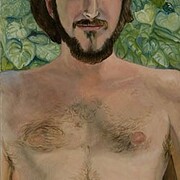Joachim Neugroschel (1938–2011)
Auteur de Yenne Velt: The Great Works of Jewish Fantasy and Occult
A propos de l'auteur
Joachim Neugroschel was a well known literary translator (he translated French, German, Italian, Russian, Yiddish, and German). He also published poetry and was a poetry magazine founder. Neugroschel was born in Vienna on January 13, 1938. He grew up in New York City and graduated from Bronx afficher plus Science in 1954, and Columbia University in 1958 with a degree in English and Comparative Literature. He moved to Europe and returned to New York six years later where he became a literary translator. Neugroschel was the winner of three PEN Translation Awards, the 1994 French-American Translation Prize, and the Guggenheim Fellowship in German Literature (1998). Neugroschel died on May 23, 2011 in Brooklyn, N.Y. He was 73. (Bowker Author Biography) afficher moins
Crédit image: Portrait by Sylvia Sleigh (1970).
Œuvres de Joachim Neugroschel
Yenne Velt: The Great Works of Jewish Fantasy and Occult (1976) — Directeur de publication — 327 exemplaires
Radiant Days, Haunted Nights: Great Tales from the Treasury of Yiddish Literature (2005) — Directeur de publication — 67 exemplaires
The Golem: A New Translation of the Classic Play and Selected Short Stories (2006) — Directeur de publication — 55 exemplaires
The Dybbuk and the Yiddish Imagination: A Haunted Reader (2000) — Directeur de publication — 33 exemplaires
Oeuvres associées
The Metamorphosis, In the Penal Colony, and Other Stories: The Great Short Works of Franz Kafka (1975) — Traducteur, quelques éditions — 1,704 exemplaires
The Necklace and Other Short Stories {Dover Thrift Editions} (1992) — Traducteur, quelques éditions — 551 exemplaires
Death in Venice and Other Tales (1998) — Traducteur, quelques éditions; Préface, quelques éditions — 493 exemplaires
On the Mystical Shape of the Godhead: Basic Concepts in the Kabbalah (Mysticism & Kabbalah) (1991) — Traducteur, quelques éditions — 249 exemplaires
Nutcracker and Mouse King, and The Tale of the Nutcracker (2007) — Traducteur, quelques éditions — 174 exemplaires
The Chronicle of the Lodz Ghetto, 1941-1944 (1965) — Traducteur, quelques éditions — 172 exemplaires
The Complete Short Stories of Marcel Proust (2001) — Traducteur, quelques éditions — 140 exemplaires
The Necklace and Other Tales {Modern Library Classics} (2003) — Traducteur, quelques éditions — 124 exemplaires
La Métamorphose Et Autres Recits (Folio (Gallimard)) (French Edition) (1993) — Traducteur, quelques éditions — 106 exemplaires
The Enemy at His Pleasure: A Journey Through the Jewish Pale of Settlement During World War I (2002) — Traducteur, quelques éditions — 58 exemplaires
Expressionism, a German intuition, 1905-1920 (1980) — Traducteur, quelques éditions — 52 exemplaires
The Shadows of Berlin: The Berlin Stories of Dovid Bergelson (2005) — Traducteur, quelques éditions — 31 exemplaires
Collected French Writings: Poems, Essays, Memories (1973) — Traducteur, quelques éditions — 9 exemplaires
Étiqueté
Partage des connaissances
- Nom canonique
- Neugroschel, Joachim
- Autres noms
- NEUGROSCHEL, Joachim
- Date de naissance
- 1938-01-13
- Date de décès
- 2011-05-23
- Sexe
- male
- Nationalité
- Austria (birth)
- Lieu de naissance
- Vienna, Austria
- Lieu du décès
- Brooklyn, New York, USA
- Lieux de résidence
- Berlin, Germany
New York, New York, USA
Paris, France
Rio de Janeiro, Brazil - Études
- Columbia University
Bronx High School of Science, New York, New York, USA - Professions
- translator
poet
art critic
magazine founder and editor - Relations
- Neugroschel, Mendel (father)
- Prix et distinctions
- PEN Translation Prize
Ordre des Arts et des Lettres (Chevalier, 1996)
French-American Translation Prize (1994)
Guggenheim Fellowship - Courte biographie
- Joachim Neugroschel was born to a Jewish family in Vienna, Austria. His father, the Yiddish poet Mendel Neugroschel, was sent to the Nazi concentration camps at Dachau and Buchenwald but was released in 1939. The family then emigrated to Rio de Janeiro, Brazil, and two years later, arrived in New York City. Joachim graduated from Bronx High School of Science and earned a bachelor's degree in English and Comparative Literature from Columbia University in 1958. After graduating, he lived in Paris and Berlin. Neugroschel returned to New York after six years, and became a literary translator. Although his father was a native Yiddish speaker, Neugroschel did not grow up speaking the language, and learned it on his own in the 1970s. He translated more than 200 books from Yiddish, French, German, Russian, and Italian, including works by Sholem Aleichem, Anton Chekhov, Alexandre Dumas, Hermann Hesse, Franz Kafka, Thomas Mann, Moliere, Marcel Proust, Joseph Roth, and Isaac Bashevis Singer, as well as contemporary writers. His translations of S. Ansky's play "The Dybbuk" and Sholem Asch‘s drama "God of Vengeance" were produced for the stage. He edited and translated the Yiddish anthologies Yenne Velt: The Great Works of Jewish Fantasy and Occult (1976), The Shtetl (1979), and The Golem (2006). He also was a critic and poet, and founded and edited, with Suzanne Ostro Zavrian, the poetry journal Extensions, which published in 1970-1975. Neugroschel was the winner of three PEN Translation Awards, the 1994 French-American Translation Prize, and a Guggenheim Fellowship in German Literature. In 1996, he was named to the French Ordre des Arts et des Lettres.
Membres
Critiques
Listes
Prix et récompenses
Vous aimerez peut-être aussi
Auteurs associés
Statistiques
- Œuvres
- 7
- Aussi par
- 36
- Membres
- 697
- Popularité
- #36,317
- Évaluation
- 3.9
- Critiques
- 6
- ISBN
- 21
- Langues
- 1
- Favoris
- 3












